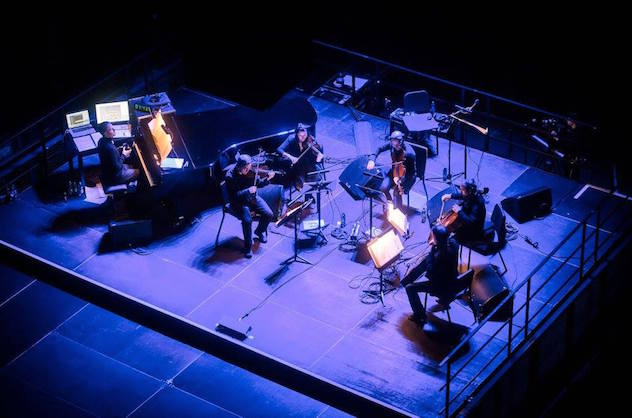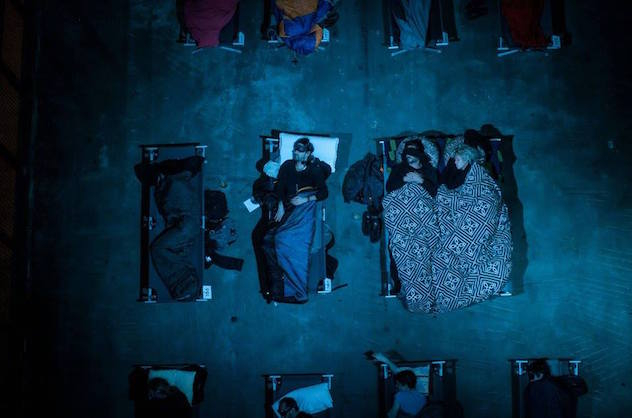- Max Richter's hybrid of electronic music and contemporary classical has captivated a sprawling audience of all ages. As I walked through Kraftwerk Berlin on Tuesday, March 15th, the vast concrete hall was filled with 20-somethings in onesies, colourful boxers and more mature loungewear. This was the world premiere of Richter's ambitious SLEEP project.
The performance was set to unfold through the night, allowing Richter and his ensemble to perform the eight-hour album in its entirety. The length was definitely daunting, but I was also excited at having the rare opportunity to hear this epic piece in real time. A heavy feeling of apprehension hung over the room before the music started: will I sleep? What if I can't? And what if I want to run out halfway through? Sleep is an intimate experience—the thought of sharing it with hundreds of others felt intrusive.
These inhibitions dissipated as soon as the music started, with Richter and co. lit up onstage by a fluorescent light. As the dust settled, patient piano chords filled the cavernous space, wrapping around my ears like a balmy breeze. The air grew subdued and hazy. Bodies lay strewn across the floor on camp beds: children cuddled their parents, couples embraced, and others lay nose to the ceiling, eyes shut. Meanwhile, the ensemble spun a delicate web of sweeping strings, all interweaving in sublime harmony. Only a few eyes peered to the stage, while most remained tightly shut for the duration. As the melancholic notes grew longer, the air grew colder and the sound of heavy breathing washed around me.
 SLEEP's metamorphosis was so gradual and meticulously orchestrated that I was never jilted from its blanket of calm. Deep into the early hours, it felt like I was one of the last awake. I couldn't sleep, perhaps too preoccupied with experiencing every moment. I was worried I'd missed the point. But then this was also part of the magic, getting to watch Richter play to a sea of sleeping bodies like some kind of guardian of slumber. It felt almost voyeuristic, but also a privilege. At one point, an ethereal note soared over ebbing drones, reverberating throughout the hall.
Richter's invitation to dream—whether asleep or awake—is something that the world is craving, a unified movement of reflection and repose. Even so, humans being humans, the inevitable eventually ensued. As the purr of a snore crept into my left ear, it was a sure sign that Richter had triumphantly succeeded in his manifesto: to create a "personal lullaby for a frenetic world."
SLEEP's metamorphosis was so gradual and meticulously orchestrated that I was never jilted from its blanket of calm. Deep into the early hours, it felt like I was one of the last awake. I couldn't sleep, perhaps too preoccupied with experiencing every moment. I was worried I'd missed the point. But then this was also part of the magic, getting to watch Richter play to a sea of sleeping bodies like some kind of guardian of slumber. It felt almost voyeuristic, but also a privilege. At one point, an ethereal note soared over ebbing drones, reverberating throughout the hall.
Richter's invitation to dream—whether asleep or awake—is something that the world is craving, a unified movement of reflection and repose. Even so, humans being humans, the inevitable eventually ensued. As the purr of a snore crept into my left ear, it was a sure sign that Richter had triumphantly succeeded in his manifesto: to create a "personal lullaby for a frenetic world."
 Photo credit /
Stefan Hoederath
Photo credit /
Stefan Hoederath
 SLEEP's metamorphosis was so gradual and meticulously orchestrated that I was never jilted from its blanket of calm. Deep into the early hours, it felt like I was one of the last awake. I couldn't sleep, perhaps too preoccupied with experiencing every moment. I was worried I'd missed the point. But then this was also part of the magic, getting to watch Richter play to a sea of sleeping bodies like some kind of guardian of slumber. It felt almost voyeuristic, but also a privilege. At one point, an ethereal note soared over ebbing drones, reverberating throughout the hall.
Richter's invitation to dream—whether asleep or awake—is something that the world is craving, a unified movement of reflection and repose. Even so, humans being humans, the inevitable eventually ensued. As the purr of a snore crept into my left ear, it was a sure sign that Richter had triumphantly succeeded in his manifesto: to create a "personal lullaby for a frenetic world."
SLEEP's metamorphosis was so gradual and meticulously orchestrated that I was never jilted from its blanket of calm. Deep into the early hours, it felt like I was one of the last awake. I couldn't sleep, perhaps too preoccupied with experiencing every moment. I was worried I'd missed the point. But then this was also part of the magic, getting to watch Richter play to a sea of sleeping bodies like some kind of guardian of slumber. It felt almost voyeuristic, but also a privilege. At one point, an ethereal note soared over ebbing drones, reverberating throughout the hall.
Richter's invitation to dream—whether asleep or awake—is something that the world is craving, a unified movement of reflection and repose. Even so, humans being humans, the inevitable eventually ensued. As the purr of a snore crept into my left ear, it was a sure sign that Richter had triumphantly succeeded in his manifesto: to create a "personal lullaby for a frenetic world."
 Photo credit /
Stefan Hoederath
Photo credit /
Stefan Hoederath